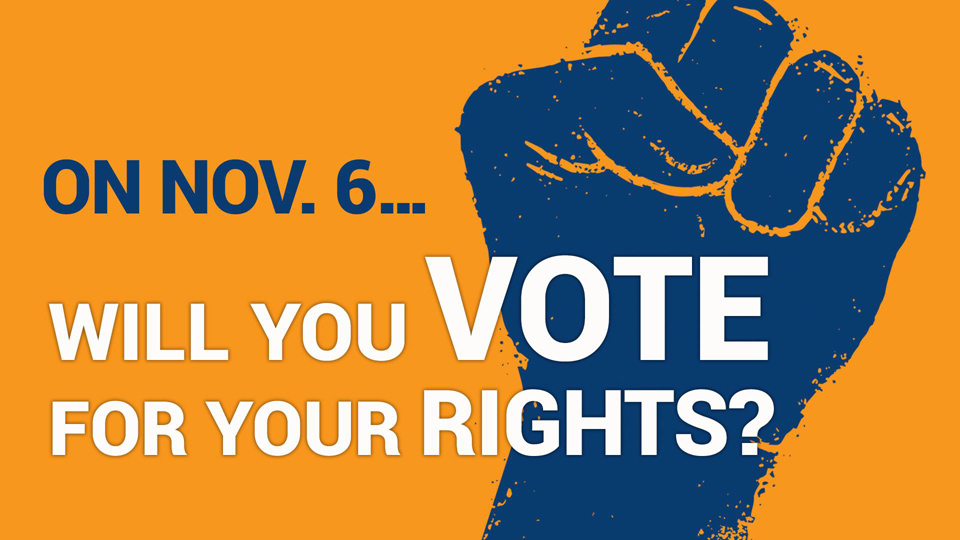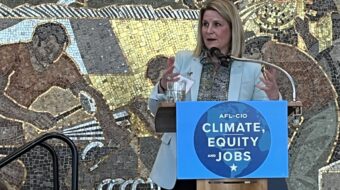
WASHINGTON—Organized labor’s record voter mobilization efforts this year, which started earlier than ever before for a mid-term election, emphasized pocketbook issues and – says AFL-CIO President Richard Trumka – will produce huge “momentum at the ballot box” on Nov. 6.
It also produced a record number of unionists running for everything from city council and county commissioner to Congress and governor, Trumka and Julie Greene, the federation’s mobilizing – and politics – director said in an Oct. 30 telephone press conference.
The two gave their outlook, which did not include predictions in many specific races, as the general election campaign entered its final week, roiled by non-pocketbook issues and a flood of corporate and GOP “dark money” in political ads, most with unnamed sponsors and lots of mud.
The non-pocketbook issues include an anti-Semitic murder of 11 worshipers at a Pittsburgh synagogue, a white racist gunning down two African-American shoppers, and 14 pipe bombs sent by a strong supporter of right-wing GOP President Donald Trump to Democrats Trump has slandered and slammed.
Forecasters and commentators have predicted waves of Democrats and women energized against Trump and of red-state and white male Republicans – many of them formerly unionized factory workers who lost jobs to unfair trade – will descend on the polls. That would be different from past patterns of mid-term elections, notably four years ago, which saw a record low turnout.
Trumka’s response was “We don’t’ ride waves. We make them.”
Labor did so with more than 10 million direct mail pieces, at least one million unionists knocking on doors every day – many of them since June – another 1.2 million mail pieces from local unions and 2,500 worksite visits since Labor Day alone, Greene said. There was also a large radio advertising campaign that began Oct. 1, along with “deep, targeted, specific digital investment,” Greene added.
Separately, the federation sent out one million pamphlets and radio ads targeted to key African-American areas, emphasizing 24 top races, such as Democrats Stacy Adams running for governor of Georgia and Andrew Gillum seeking Florida’s governor’s chair. Both are African-Americans and both are in toss-up races against far-right wing Trump-backing Republicans.
In the one gubernatorial race where the AFL-CIO didn’t get involved, the campaign by Democrat Ben Jealous, former head of the NAACP, for the Maryland governorship, the AFL-CIO turned the task of supporting him over to local unions, the state federation and the A. Philip Randolph Institute, Trumka said. The institute is one of labor’s two constituency groups for African-American workers.
While Trumka didn’t predict whether pro-worker forces and specifically congressional Democrats would retake control of the U.S. House and not suffer further losses in the narrowly GOP U.S. Senate, he did note the record number of unionists seeking state legislative posts.
In one of his few forecasts, Trumka predicted union turnout would make a key difference in several key governors’ races, including Florida, Georgia, Ohio, Wisconsin, and Pennsylvania.
Both the gubernatorial and state legislative races are important. The GOP now holds all those governors’ chairs except in Pennsylvania, where incumbent Tom Wolf (D) faces a heavily gerrymandered GOP-controlled legislature.
But the 36 governors elected this fall and all the legislatures will not only pass – or defeat – pro-worker laws over the next two or four years, but also will determine, though drawing congressional and state legislative district lines, whether pro or anti-worker lawmakers control states and Congress, via redistricting.
And all of labor’s fliers, phone banks, and door knocks emphasized kitchen-table issues, measured by responses from workers to the AFL-CIO earlier this year, then matched up, candidate by candidate.
Those issues included better living wages, the right to organize, overall worker rights, safer workplaces, affordable health care, a secure retirement – including preservation of Social Security and Medicare – and “a real voice on the job,” Trumka said.
Those issues also served as a litmus test for hopefuls who wanted workers’ support, though Trumka didn’t use those exact words. But he reiterated “there’s no room” for a difference on issues between unions and the candidates they endorse.
“You either support” workers on “these issues or you don’t,” Trumka declared. “If you do, you’ll find us knocking on doors for you. If you don’t you’re on your own.”

MOST POPULAR TODAY

‘Warning! This product supports genocide’: Michigan group aims to educate consumers

Hold the communism, please: SFMOMA’s Diego Rivera exhibit downplays artist’s radical politics

Ohio: Franklin County treasurer attends Netanyahu meeting, steps up Israel Bond purchases

“Trail of Tears Walk” commemorates Native Americans’ forced removal

After months of denial, U.S. admits to running Ukraine biolabs






Comments